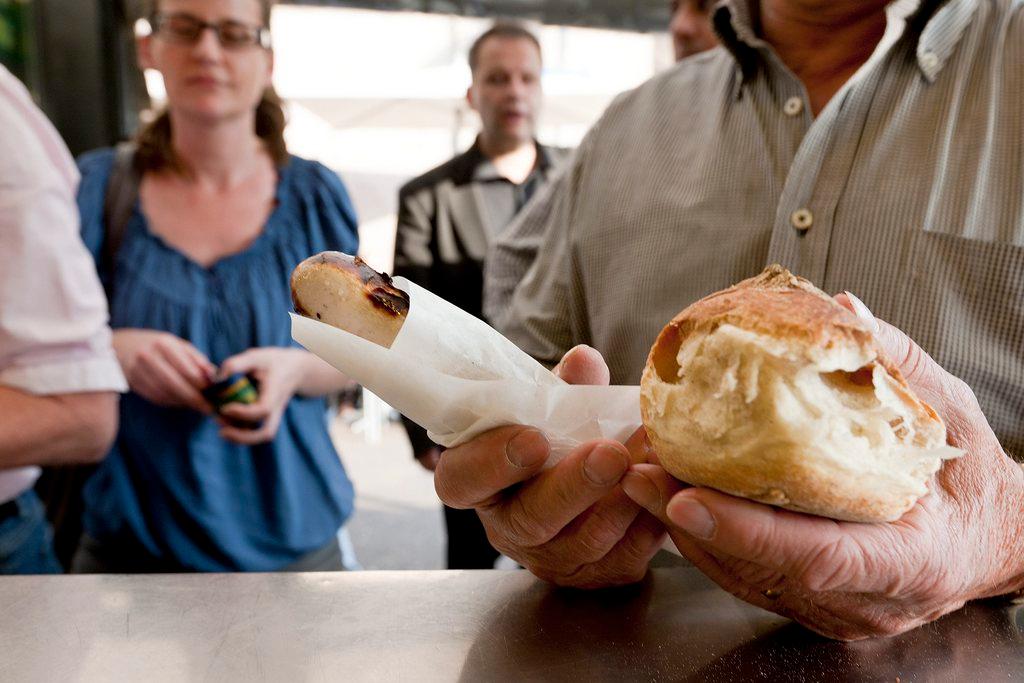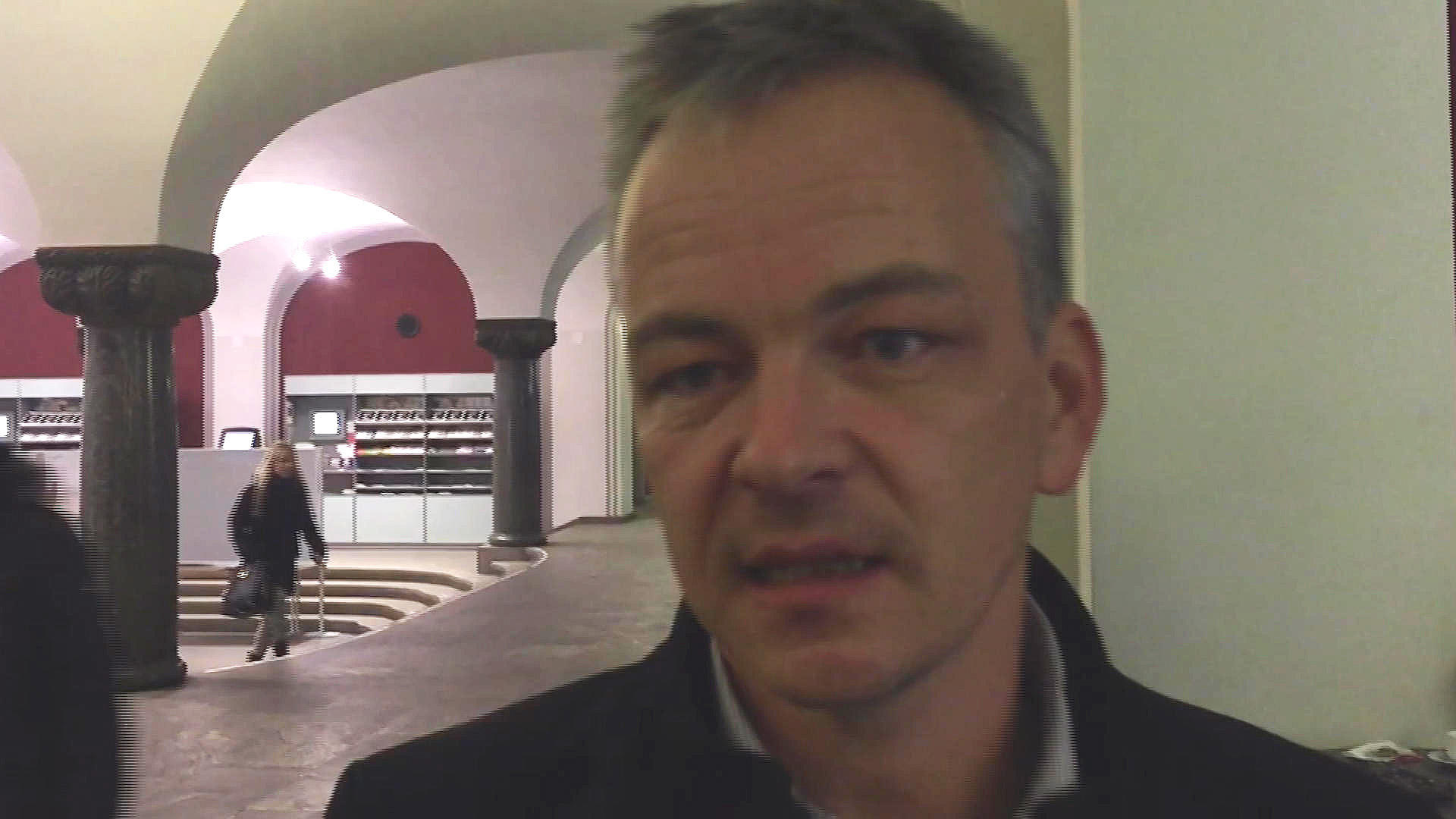Can gifts help save local democracy?

Free garbage bags, grilled sausages, cold beer and vouchers. These are just a few of the gifts some local authorities are using to tempt citizens to participate in local decision-making. But does direct democracy really need such handouts?
Switzerland’s system of direct democracy appears to be struggling. At least that’s the impression given by the large number of empty chairs at the 4,000 local assembly meetings that take place every year in 2,000 communes across Switzerland.
This article is part of #DearDemocracy, a platform on direct democracy issues, by swissinfo.ch.
At these mostly evening gatherings, local citizens decide how much money the village can spend, whether a new school building may be built or if taxes should be increased.
According to Daniel Kübler, a professor of political science and head of the Center for Democracy in Aarau, there is very little data on the number of participants at community meetings.
“But over the decades, a steady decline can be observed,” he noted.
Today, on average less than 10% of registered voters take part in such meetings – but the number varies greatly by commune.
There are many reasons for the empty chairs: complaints about the complexity of the issues being dealt with, too little information or the growing anonymity in larger communities.
Shrinking number of communes
In 2016, 39 local communes disappeared in Switzerland. From January 1, 2017, there were 2,255 communes. The decrease follows mergers between communes, generally caused by the lack of funds or human resources. Local communes are the backbone of Swiss democracy, as they enjoy extensive autonomy. This is linked to the principle of federalism, which divides power in Switzerland on three levels between the Confederation, cantons (regions) and smaller communes. In 1860, Switzerland comprised over 3,200 communes.
This trend has become a problem for the entire system of Swiss direct democracy. It can only work if people participate at the grassroots level and if they are really motivated.
Football, restaurant vouchers and babysitting
Many communes are not prepared to just sit and watch while this slow-burning phenomenon threatens local democracy, and they have decided to do something about it.
Some villages are offering babysitting services to lure both parents to town hall meetings. Many communes set the assembly meeting date on Saturday afternoons to avoid a clash with the traditional working week. Others organise raffles, offering participants free train tickets or vouchers at a local restaurant.
Some actually hand out small gifts, such as a roll of garbage bags worth CHF22 ($21.45). And during last summer’s European Football Championship at least one commune invited participants to watch the Swiss national team play a match on the big screen before the town hall meeting.
The village of Wimmis in the Bernese Oberland is trying hard to do something about the empty town hall meeting chair problem.
“We are always trying to find something new that brings people to the meeting. Some things work, others do not,” explained Wimmis communal president Peter Schmid.
It’s now a tradition to have a small bite to eat after each gathering. In winter, there is a free drink, bread and cheese. In the summer, participants can enjoy grilled sausages and cold drinks.
Valuable collaboration
These small offerings are a small reward, but they are also a way of getting people to talk to each other, explained Schmid.
“These kinds of informal gatherings are very valuable. Many only ask questions at that moment because they do not feel confident enough during the actual town hall meeting.”
Since they started organising free drinks and food in winter and summer, the number of participants at the Wimmis local assembles has increased from 40 to around 80 people per meeting, but this is still only a small share of the 1,800 eligible voters in the commune.
Last December Wimmis also introduced a free taxi service for those who cannot walk or don’t live close to the centre. But it has not been used very much. For the last town hall meeting, only one person took the free taxi.
Wimmis has also tried using incentive schemes for local elections, not just at local assemblies. Raffles were held, offering ‘Wimmis vouchers’ for use in the local butcher’s, baker’s and restaurant.
“But we have to be careful that we don’t overdo it,” said Schmid. He said local residents must never feel that they can only participate if there is a gift.
“It must be discreet, a small thank you.”
Gifts undermine citizenship
But this seems to be the problem with such incentive systems. As a study by the Center for Democracy in Aarau reveals, they can undermine the delicate citizenship structures, which lead people to participate politically.
In their study, interviewees were shown invitations to fictional community meetings, and were asked whether or not they would attend. The study revealed that the group of regular assembly participants were put off by the idea of gifts. And for those who normally avoided town hall meetings, discussing a tax increase was much more attractive than the prospect of a gift.

More
Why incentives be a bad thing
Daniel Kübler says it all depends on the motivation of the participants attending. “Receiving a gift is viewed as a devaluation of one’s own commitment and of one’s obligation as a citizen.”
He cites a study with similar results that showed that acceptance of a setting up of a nuclear waste dump in a local commune fails if the inhabitants are told that they will receive money in return. “You destroy personal motivation,” he added.
Instead of receiving gifts, Kübler believes measures should be introduced that make it easier for citizens to participate in local assemblies, such as free taxi or childcare services. He says a comprehensive information brochure could also be produced that outlines all the different arguments for a given project.
This traditional form of democracy by assembly democracy seems to be struggling in small Swiss villages. But Kübler believes it works.
His study shows that the absence of the villagers at meetings is not due to a rejection of the system, quite the contrary.
All participants – whether regulars or non-attendees at local assemblies – said they were generally satisfied with the work of village or communal officials.
“The residents seem to consider the decisions taken at the municipal meetings as legitimate – whether they have taken part in the decision-making process or not,” said Kübler.
Translated from German

In compliance with the JTI standards
More: SWI swissinfo.ch certified by the Journalism Trust Initiative











You can find an overview of ongoing debates with our journalists here . Please join us!
If you want to start a conversation about a topic raised in this article or want to report factual errors, email us at english@swissinfo.ch.